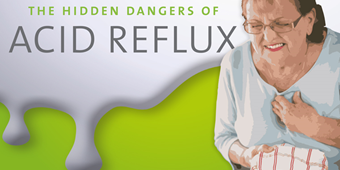Bowel Basics: Is it IBS or IBD?

Find Your Perfect Match
Answer a few questions and we'll provide you with a list of primary care providers that best fit your needs.
Only one letter sets them apart. But irritable bowel syndrome (IBS) and inflammatory bowel disease (IBD) are distinctively different in their characteristics and treatment. Getting the right diagnosis will produce better symptom relief and improve your long-term health and quality of life.
Here’s where it gets tricky. Symptoms can and do overlap.
People may say they have diarrhea, constipation, abdominal pain and maybe blood. All of those symptoms can be a variety of issues from cancer to irritable bowel syndrome. That’s why it’s so important to have your symptoms checked out by a health care provider.
How are IBS and IBD the Same?
Both conditions are very common illnesses that affect the gut. Neither has a cure, but treatments are available to reduce and control the symptoms. In addition, both:
- Are chronic, long-term medical conditions
- Affect the digestive tract
- Can cause abdominal pain, cramps, constipation, diarrhea and urgent bowel movements
- Have a tendency to affect young people
- Have unknown specific causes
You can have both conditions at the same time. About 20 percent of patients with IBD also have IBS symptoms. In many cases, the IBS is undiagnosed until IBD is diagnosed.
How are IBS and IBD Different?
These conditions differ mainly in their type and treatment, along with a few symptoms that can distinguish them.
Inflammatory bowel disease is classified as a structural inflammatory disease that causes chronic swelling and damage within the digestive tract, often in the lower portion. Crohn’s disease and ulcerative colitis are types of IBD.
Irritable bowel syndrome is not a disease. It’s considered a non-inflammatory functional disorder, which means your digestive tract behaves in an abnormal way without damage to its structure. In IBS, your digestive system moves more slowly (constipation) or quickly (diarrhea) than average.
Besides symptoms resembling IBS, IBD also can cause:
- Eye discomfort
- Extreme fatigue
- Joint pain
- Lack of appetite and weight loss
- Fever
- Rectal bleeding
Patients with IBD are at an increased risk of colon cancer, while IBS patients are not.
That’s why it’s so important to have your symptoms checked out by a health care provider.
Diagnosis and Treatment of IBS and IBD
Imaging procedures as well as blood and stool tests that check for inflammation make IBD a little easier to diagnose than IBS. Typically, IBS is diagnosed once other, more serious health issues are ruled out.
Inflammation consequences of IBD may require hospitalization, heavy-duty medication, nutritional support and even surgery. The primary treatment goal is preventing inflammation and reducing damage to your intestines.
Conversely, management of IBS symptoms revolves around diet and lifestyle changes, including stress management, and in some cases, medication.
Talk with your doctor if you experience any change in bowel habits or symptoms. Getting the right diagnosis will bring effective treatment sooner and improve your quality of life.
Find Your Perfect Match
Answer a few questions and we'll provide you with a list of primary care providers that best fit your needs.
American College of Gastroenterology; Crohn’s and Colitis Foundation of America; GI Society; Healthline




